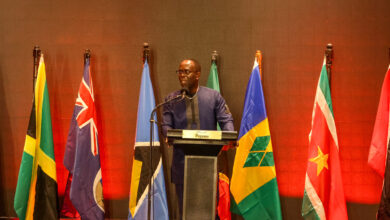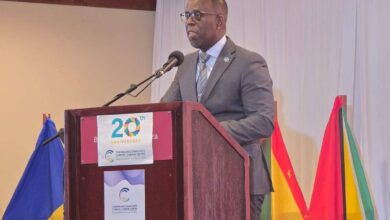FOUR years have passed since that devastating 2010 earthquake levelled Port-au-Prince, the Haitian capital, wreaked havoc on the lives of multiple thousands of Haitians, and ruined the country’s infrastructure and local economy.Ambassador Irwin LaRocque, Secretary-General of the Caribbean Community (CARICOM), has noted that there has since been “considerable progress” made in rebuilding Haiti.
Addressing the issue in a statement on Friday, Ambassador LaRocque said: “Though the task is not yet completed as it continues its reconstruction process following the catastrophic earthquake of 2010, the thoughts and prayers of the (CARICOM) Community continue to be with the People of Haiti as they commemorate the fourth anniversary of the tragedy (which occurred) on 12th January… The Government and People of Haiti have shown themselves to be resilient, creative, focused and determined. These qualities have allowed Haiti to overcome many of the challenges that have threatened its aspirations.
“This is not surprising when one takes into account the proud history of Haiti and its epic and victorious struggle for independence against the odds and to overthrow slavery. These qualities come into play once again in your country’s quest to achieve its highest aspirations.”
HARD WORK
The recently accredited Haitian plenipotentiary representative to the Community, Peterson Benjamin Noel, also addressed the issue, making it clear that the Haitian people were working hard to rebuild their country.
He said much is being done to rebuild the economy, and improve the business climate as well as the security environment. Noel said, “Tens of thousands of people perished in the devastating earthquake four years ago.
“Haitian people, hand in hand, are working very hard to rebuild the country stronger than ever. The economy is growing at a positive rate, (and) the business climate has improved as well as the security environment, as you have witnessed during your recent visit to Haiti,” the ambassador told the CARICOM Secretary General
He stressed that Haiti is back on track. “Haiti is open for business,” Noel said. Haiti’s tax office has recorded 7,883 new businesses in Port-au-Prince from November 2010; most (1,302) are “general”, while 1,207 are “small grocers and general merchants”. Several hundred NGOs are included in this total.
When the 7.0 magnitude quake struck near Port-au-Prince, 3.5 million people were affected; and an estimated 220,000 died while over 300,000 were injured. An estimated 25 per cent of civil servants in Port-au-Prince also died. More than 188,383 houses were badly damaged, and 105,000 were destroyed by the earthquake, leaving 1.5 million people homeless. Over 600,000 people left their home area in Port-au-Prince and mostly stayed with host families. At its peak, 1.5 million people were living in camps, with over 100,000 being at critical risk from storms and flooding.
After the quake, there were 19 million cubic metres of rubble and debris in Port-au-Prince – enough to fill a line of shipping containers stretching end to end from London to Beirut. Some 4,000 schools were damaged or destroyed, along with 60 per cent of Government and administrative buildings, 80 per cent of schools in Port-au-Prince, and 60 per cent of schools in the South and West Departments.
Unrelated to the earthquake, but causing aid response challenges, was the outbreak of cholera in October 2010. By July 2011, some 5,899 persons had died as a result of the outbreak, and 216,000 had been infected.
Several million dollars have been raised in aid, and the local government has been undertaking a massive campaign to attract investors as Haiti rebuilds.
Written By Vanessa Narine






